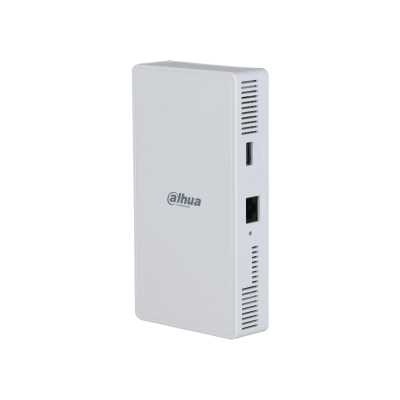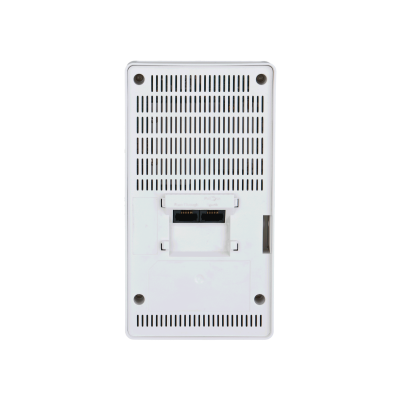AWA6220-W
802.11ax Wall-Plate Wireless Access Point
> 802.11ax Wall-Plate Wireless Access Point.
> Internal Antennas 4 Streams Dual Radio.
> Up to 1.775Gbps access rate.
> DL/UL MU-MIMO.
> OFDMA.
> RF Optimizing Engine.
> Maximum transmit power up to 20 dBm.
> Antenna gain up to 5 dBi.

Hardware
Weight (excluding mounting accessories)
0.25 kg (0.55 lb)
Dimensions (excluding mounting and accessories)
160 mm × 86 mm × 30 mm (6.30" × 3.39" × 1.18") (L × W × H)
Ethernet Ports
4 x 100/1000 Mbps Base-T RJ-45
1 x 100/1000 Mbps Base-T RJ-45 (Uplink)
2 x RJ-45 pass-through port
PoE
Port1: 802.3af
Local Power Supply
54 VDC
Antenna
Built-in omni-directional antenna
3dBi antenna gain @2.4 GHz
3dBi antenna gain @5 GHz
Working Frequencies
802.11ax/ac/n/a : 5.725 GHz–5.850 GHz; 5.47 GHz–5.725 GHz; 5.15 GHz–5.35 GHz
802.11ax/b/g/n: 2.4 GHz–2.483 GHz
Modulation Mode
11b: DSS: CCK@5.5/11 Mbps, DQPSK@2 Mbps, DBPSK@1Mbps
11a/g: OFDM: 64QAM@48/54 Mbps, 16QAM@24 Mbps, QPSK@12/18 Mbps, BPSK@6/9 Mbps
11n: MIMO-OFDM: BPSK, QPSK,16QAM, 64QAM
11ac: MIMO-OFDM: BPSK, QPSK, 16QAM, 64QAM, 256QAM
11ax: MIMO-OFDM: BPSK, QPSK, 16QAM, 64QAM, 256QAM, 1024QAM
Maximum Transmit Power
20 dBm
Reset/Restoration To Factory Default
Yes
State LED
Alternating flashing mode, orange/green/blue for different working states, breathing mode
Enviorment
Indoor
Working Temperature
–10 °C to 55 °C (14 °F to 131 °F)
Storage Temperature
–40 °C to 70 °C(–40 °F to +158 °F)
Working Humidity
5%–95% (non-condensing)
Storage Humidity
5%–95% (non-condensing)
Protection Class
IP31
EMC
CE EMC, CE RED
MTBF
>250000H
Software specifications
Compliance
compliant with 802.11a/b/g/n/ac/ax
Working Frequencies And MIMO
2.4G 2*2 MIMO 0.575 Gbps
5G 2*2 MIMO 1.2 Gbps
Bandwidth
20MHz/40MHz/80MHz
WLAN Basics
Maximum number of clients per radio:512
Virtual APs:32
Open system/shared key authentication
Broadcast probe request acknowledge control
Concurrent login of WPA, WPA2,WPA3 and Pre-RSNA users
RTS/CTS
CTS-to-self
802.11k and 802.11v smart roaming
802.11r fast transition roaming
Advanced Traffic Management
Restrict low rate/sticky terminals access
Channel reuse
Receiver sensitivity adjustment
Automatic channel/power/bandwidth adjustment
Hide SSID
Hotspot 2.0
Security Policy
WEP-64/128/152bit, dynamic WEP, TKIP, AES, EAP, CCMP , WPA3
Multiple triggering conditions for unicast and broadcast key update
Support 802.11i
802.1X authentication, MAC authentication, PSK authentication, Portal authentication, PPSK
Layer 2 user isolation
SSID-based user isolation
Packet filtering
MAC address filtering
Broadcast storm suppression
Wireless EAD
SSID and VLAN binding
WIDS/WIPS
Rogue device detection and countermeasure
Dynamic ARP Inspection
IP Source Guard (IPSG)
Management frame protection (802.11w)
AAA
RADIUS client
Multiple-domain authentication server
Backup authentication server
Layer 2 And Layer 3 Features
IP address configuration: Static IP (available only in fat AP mode)/DHCP assigned IP (Option 60)
IPV6: Native IPv6/IPv6 Portal/IPv6 SAVI
ACL: IPv4/IPv6
Local forwarding based on SSID and VLAN
Link Layer Discovery Protocol (LLDP)
SSID-based VLAN assignment
EoGRE Tunnel
Multicast: IGMP Snooping/MLD Snooping
QoS
802.11e :Wi-Fi Multimedia (WMM)
802.1p priority and marking on Ethernet ports
Priority mapping for wired and wireless packets
SSID/VLAN and QoS policy mapping
Layer 2 to Layer 4 packet filtering and traffic classification
CAR
Client bandwidth management
Traffic-based load balancing
Session-based load balancing
Frequency-based load balancing (supports dual-band)
Band navigation(5G priority)
Multicast optimization (IPv4/IPv6)
Call Admission Control (CAC)
Airtime optimization
Airtime fairness
Layer 4-7 application identification
SVP Phone
Management And Maintenance
AP Working Mode : Fit/Fat
Network management:Trap, HTTP(S), SSH, Telnet, FTP/TFTP, SNMP V1/V2/V3 only applicable in Fat mode
Management SSID
Syslog
Remote probing and analysis















